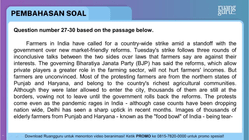Iklan
Pertanyaan
Question number 27-30 based on the passage below.
Farmers in India have called for a country-wide strike amid a standoff with the government over new market-friendly reforms. Tuesday's strike follows three rounds of inconclusive talks between the two sides over laws that farmers say are against their interests. The governing Bharatiya Janata Party (BJP) has said the reforms, which allow private players a greater role in the farming sector, will not hurt farmers' incomes. But farmers are unconvinced. Most of the protesting farmers are from the northern states of Punjab and Haryana, and belong to the country's richest agricultural communities. Although they were later allowed to enter the city, thousands of them are still at the borders, vowing not to leave until the government rolls back the reforms. The protests come even as the pandemic rages in India - although case counts have been dropping nation wide, Delhi has seen a sharp uptick in recent months. Images of thousands of elderly farmers from Punjab and Haryana - known as the "food bowl" of India - being tear-gassed and sprayed with water in the winter could have won them tremendous public sympathy in India and also from the diaspora around the globe. The farm bills roiled the country's parliament when it was passed in September last year, which led to the suspension of eight opposition members.
Taken together, the contentious reforms will loosen rules around the sale, pricing and storage of farm produce - rules that have protected India's farmers from an unfettered free market for decades. They also allow private buyers to hoard essential commodities for future sales, which only government-authorised agents could do earlier; and they outline rules for contract farming, where farmers tailor their production to suit a specific buyer's demand. One of the biggest changes is that farmers will be allowed to sell their produce at a market price directly to private players - agricultural businesses, supermarket chains and online grocers. Most Indian farmers currently sell the majority of their produce at government-controlled wholesale markets or mandis at assured floor prices.
These markets are run by committees made up of farmers, often large landowners, and traders or "commission agents" who act as middle men for brokering sales, organising storage and transport, or even financing deals. The reforms, at least on paper, give farmers the option of selling outside of this so-called "mandi system". The issue is that it's unclear how this will play out in reality. Farmers are mainly concerned that the reforms will eventually lead to the end of wholesale markets and assured prices, leaving them with no backup option. That is, if they are not satisfied with the price offered by a private buyer, they cannot return to the mandi or use it as a bargaining chip during negotiations. The government has said the mandi system will continue, and they will not withdraw the floor prices they currently offer. But farmers are suspicious. "First, farmers will feel attracted towards these private players, who will offer a better price for the produce. The government mandis will pack up meanwhile and after a few years, these players will start exploiting the farmers. That's what we fear," Multan Singh Rana, a farmer in the northern state of Punjab, told BBC Punjabi.
What is the text primarily concerned with?
What is the text primarily concerned with?
Indian farmers.
New market-friendly reforms.
Indian farmers protest against new market-friendly reforms.
New market-friendly reforms that changed the way Indian farmers do their business.
Indian farmers concerned about the new market-friendly reforms established.
Iklan
N. Puspita
Master Teacher
2
0.0 (0 rating)
Iklan
Pertanyaan serupa
RUANGGURU HQ
Jl. Dr. Saharjo No.161, Manggarai Selatan, Tebet, Kota Jakarta Selatan, Daerah Khusus Ibukota Jakarta 12860
Produk Ruangguru
Bantuan & Panduan
Hubungi Kami
©2026 Ruangguru. All Rights Reserved PT. Ruang Raya Indonesia

















